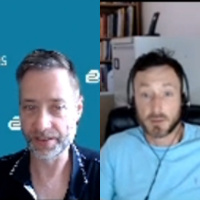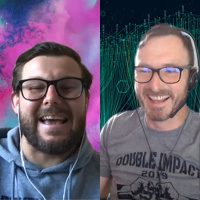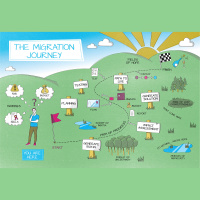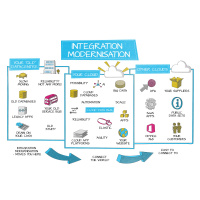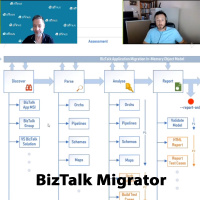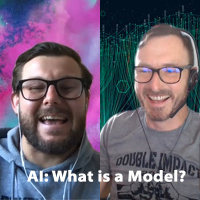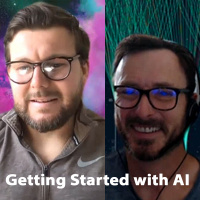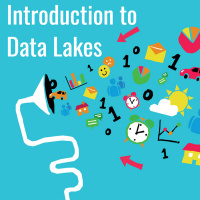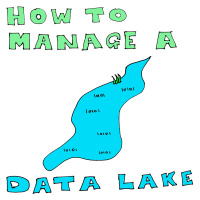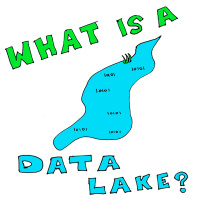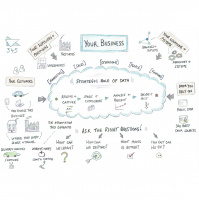Synopsis
345 Tech Talks are conversations between Andrew and Paul about how to build and operate amazing software. We focus on software delivery, technology and architecture. Looking at a different topic each week, we roam freely over the domain of tech and invite you to ramble along with us!
Episodes
-
23: Episode 23: Building Logic Apps LIVE
18/08/2020 Duration: 01h19minThis is a recording of our recent webinar where we were building Logic Apps LIVE! Andrew and Dan take you on a journey of discovery in the world of cloud integration, building your first logic app and showing you some great tips along the way.
-
22: Episode 22: How Easy is it to Build and Train a Machine Learning Model?
18/08/2020 Duration: 15minIn this episode Andrew and Danny run a simple demo that builds a Machine Learning Model using Azure Machine Learning and Python. This is to demonstrate that the tools and the code to build machine learning models are easy to use and accessible...what you need to focus on is the data and choosing the correct model.
-
21: Episode 21: Webinar - Deep Dive - what does a BizTalk app like on Azure? (Part II)
18/08/2020 Duration: 01h20sIn this video Andrew and Dan discuss what a target solution would look like for a migrated BizTalk application running on Azure Integration Services. This considers things like how we support publish-subscribe, ordered delivery, correlation and port processing. This webinar series is all about migrating BizTalk applications to AIS, which is inspired by the announcement that Microsoft are releasing the BizTalk Migrator this autumn - a BizTalk Migration Tool that will make the journey of migrating from BizTalk to Azure simpler, faster and easier.
-
20: Episode 20: Webinar - Deep Dive - what does a BizTalk app like on Azure? (Part I)
18/08/2020 Duration: 01h18minIn this video Andrew and Dan discuss what the technology stack would look like for a migrated BizTalk application running on Azure Integration Services. This webinar series is all about migrating BizTalk applications to AIS, which is inspired by the announcement that Microsoft are releasing the BizTalk Migrator this autumn - A BizTalk Migration Tool that will make the journey of migrating from BizTalk to Azure simpler, faster and easier.
-
19: Episode 19: Webinar - What do we know about Microsoft's BizTalk Migrator so far?
25/06/2020 Duration: 01h08minAt Integrate 2020 at the start of June Microsoft announced that they would be releasing a BizTalk Migrator - a tool to help you migrate BizTalk applications to Azure Integration Services. This webinar unpacks all of the information released so far so you can get the best insights into what it means for you.
-
18: Episode 18: AI - What is a Model?
29/05/2020 Duration: 12minA machine learning model is a mathematical function. There, that was easy! In order for Machine Learning AI models to operate on something you have to reduce it to numbers. Fortunately, everything in the world of computers is a number underneath. A photo is a collection of numbers. A video is a collection of numbers. You feed these into your model and what you get back is....more numbers. The maths that makes this happen is quite mind-bending. The good news - you don't need to know it! The AI tools we now have available do the heavy lifting for us and let us build and use models without needing a PhD in mathematics.
-
17: Episode 17: Getting Started with AI
21/05/2020 Duration: 17minIn this video Andrew and Danny talk about the first steps you can take to start using AI within your organisation. It's as easy as calling an API. The only limits are your imagination and ambition.
-
16: Episode 16: Introduction to Data Lakes - Data Science South Coast
30/04/2020 Duration: 46minIn this presentation we're talking about Data Lakes. This is a big topic, and we're covering all the bases for planning your Data Lake: What is a data lake? Why would you need one? What you would put in one? How you would build one? What you do when you’ve got one? What does one cost? What problems should you avoid?
-
15: Episode 15: ⭐ Special ⭐ Data Science South Coast March 2020 - Data Science in Marketing
02/04/2020 Duration: 01h05minThis video is a recording of the online March 2020 meetup of a combined Data Science South Coast and Solent IoT and ML Meetup. In this webinar Tom Wright presents a great talk on the use of data science in biddable marketing. The sheer scale of the data challenge here is mind boggling, with trillions of data points processed every month. Join Data Science South Coast here: https://www.meetup.com/Data-Science-South-Coast/ Join the Solent IoT and ML meetup here: https://www.meetup.com/Solent-IoT-and-Machine_Learning-Meetup/ Category
-
14: Episode 14: How to Manage a Data Lake
20/03/2020 Duration: 32minThings you need to look out for in data lakes: - Security - Access and audit - Data sovereignty - Compliance, GDPR We take you through the things you should get right up-front so your data lake solution is fit for purpose!
-
13: Episode 13: What is a Data Lake?
13/03/2020 Duration: 31minIn this episode Andrew and Paul chat about what a data lake is, what you put in it and why you want one.
-
12: Episode 12: Understanding the Strategic Role of Data in Your Business
08/01/2020 Duration: 18minThe diagram we're talking about in the video is here: https://345.technology/wp-content/uploads/2019/12/Data-Strategy-Your-Business-2048x1445.png The 345 data engineering pack is available for download here: https://345.technology/wp-content/uploads/2019/12/345-Technology-Data-Engineering-Pack.pdf
-
11: Episode 11: First Impressions from Blockchain Expo Global
28/04/2019 Duration: 41minShow notes: https://www.345.systems/podcast/episode-11-first-impressions-from-blockchain-expo-global/ This week the 345 / Glu team were at Blockchain Expo Global (https://www.blockchain-expo.com/) at Kensington Olympia (https://olympia.london/) , seeing what's happening in the world of blockchain and talking to people from across the industry. From this I've distilled some thoughts about what's hot at the moment and what's not. This is my personal take on the expo, I'm sure the rest of the guys will have more to add! On the 345 Tech Talks podcast we haven't even started talking about blockchain yet, so it would be unfair for us to dive in too deep. Good job, because this is a good starting point for an overview. What's Blockchain? So what's blockchain? Well, we can conceive of a blockchain as a type of database where chunks of data ("blocks") are written one after another to form a series of connected links ("chain"), thus blockchain. There you go. Not too hard was it? The clever stuff is making that actuall
-
10: Episode 10: Recap, Reorient, Remux
12/04/2019 Duration: 43minTo view the episode on the 345 website click here (https://www.345.systems/podcast/episode-10-recap-reorient-remux/?utm_source=ep10&utm_medium=Audioboom&utm_campaign=345TechTalks) . I've been wanting to do this episode for a while now, to place some context around why we have chosen the subjects we have, and where we have come from in terms of our thinking. Paul being away for the weekend has given me an ideal opportunity to sneak in with this one! 345 as an organisation stemmed from a great kickass dev team that the founders used to be in. When that particular team disbanded we left to form 345 and continue our good work. The specialisms we had adopted over the years did give 345 a particular focus on the following areas: Business process automation. Call it what you will - Straight Through Processing (STP), Business Process Management (BPM), Integration, Orchestration - all of these terms mean a similar thing. We spent a lot of time writing software that automated business processes. Microservices. When yo
-
9: Episode 9: How to Rapidly Deliver a Kubernetes Microservices Platform
29/03/2019 Duration: 01h12minSummary At a high level, our approach is split into 4 areas: Define - discovery and definition of what we're going to deliver Deliver - delivering the DevOps, infrastructure and shared services Exploit - maximising the ability to deliver apps onto this platform Maintain - ensuring we stay current, and making sure we can adapt to future needs In this podcast we're looking at the first two of these. We are going from scratch to the point where you have the technology in place on which you can deliver and operate your microservices. When we talk about the technology platform, the latest iteration is the one we have implemented for Glu (https://www.glu.lu/ (https://www.glu.lu/?utm_source=ep09&utm_medium=Audioboom&utm_campaign=345TechTalks) ). This is launching in Q2 2019 and is a full, living example of the tech we are talking about. Define In the define phase we have 3 main areas of activity: Technical scope - discovering the main goals and constraints within which we work. This includes things like preferred cl
-
8: Episode 8: Our DevOps Stack
22/03/2019 Duration: 01h15minThis article and episode is aimed at a technical audience: architects, developers and release managers. A foundation for rapidly building microservices on Kubernetes We’re looking now at the DevOps stack we’re building with, notably the stack that we are using to build Glu (https://www.glu.lu/ (https://www.glu.lu/?utm_source=ep08&utm_medium=Podcast&utm_campaign=345TechTalks) ) that will go into live Beta next month. If you’ve been following the podcast series you’ll know that we’re building a microservices platform leaning heavily on Kubernetes hosted in AWS. The tech stack we describe here is our way of doing this – if you’re looking to put in place a similar stack elsewhere you should be able to get some great ideas from what we’re discussing here. You can always book a free call with us to talk about your technology stack and your DevOps needs, we love hearing from you! Going through the stack one piece at a time We’ll step through the stack piece by piece and explain what we use each of these for. This is
-
7: Episode 7: Our 10 Principles for DevOps Part Deux
15/03/2019 Duration: 01h13minThis follows on from the first part where we covered the first 5 principles of DevOps: Automate everything Git is the source of truth No sensitive data or values are stored in Git Adopt an Infrastructure as Code (IaC) approach Adopt an Immutable Infrastructure approach We get straight onto the content by diving straight into the remaining 5 principles: Adopt an Immutable Application approach Especially pertinent to testing. We need to make sure that our application is isolated when regression testing so that we don't pollute our results when other tests are running or other changes are being tested. This unblocks our release pipeline because we can test in parallel and not in series. A great thing here is that we can reduce our infrastructure costs using Kubernetes as we can create short-lived isolated applications for testing. Previously we might have had to have a large number of test environments to parallelise, at high cost. Each infrastructure environment gets its own Git repository This is a security is
-
6: Episode 6: Our 10 Principles for DevOps (Part One)
08/03/2019 Duration: 01h09minIf you work in software development, and if you haven't been living in a cave since 1994, you'll have heard about DevOps. Everyone talks about it, everyone has their own idea about what's involved and everyone assumes that everyone else has got it better. Maybe it's more like sex than we thought... This is another big topic and we've split the discussion across two episodes. In this episode we're introducing DevOps and looking at principles 1-5. In the next episode we'll look at principles 6-10 and wrap up. This is a feast of content for those who work in software, and you're in for a treat if you like to draw on the experience of people with decades of industry experience. Here are the highlights of the episode: Principle #1: Automate everything Spare everyone from the toil of repetitive work. Humans should focus on solving problems not cranking the handle on the machine. Automation is a prerequisite for quality. Without automation there is no repeatability, and without repeatability there is no quality. Ou
-
5: Episode 5: 7 Outcomes for Success in Software Development Part Deux
01/03/2019 Duration: 01h05minIn this episode we're closing off the remaining 4 outcomes for success in software development. In the first episode we covered Rapid Delivery, Available & Scalable and Secure. Remember, you can always read the 7 outcomes on the 345 site here (https://www.345.systems/how-we-help/) . The last 4 outcomes discussed in this episode are: Quality & Bug-Free Quality in software is layered, we approach it in a number of ways: Does the solution meet design intent? (This can be tech design and product design) Does the code pass static analysis, does it appear to be well written? Does the code pass unit tests, and is code coverage sufficient? Does the solution work when integrated with the other components? Does the solution meet non-functional goals such as performance and resilience? Does the usability meet the needs of the users? Do users love the solution? Each of these layers of quality control needs a different approach to testing and quality assurance. Each of these layers needs to be built into the process. Au
-
4: Episode 4: 7 Outcomes for Success in Software Development (Part 1)
22/02/2019 Duration: 54minBlog post for the episode is here: https://www.345.systems/podcast/episode-4-7-outcomes-for-success-in-software-development-part-1/ (https://www.345.systems/podcast/episode-4-7-outcomes-for-success-in-software-development-(part-1)/) Define what success looks like for you The 345 Method is a way of getting you to success. You start by looking at the following areas that are affected by your technology solutions: Rapid Delivery Available & Scalable Secure Quality & Bug-Free Costs Optimised Functional & Lovable Standards Compliant You use a consistent scoring system You use a scoring system from 0 to 10 that allows you to assess where you are. The scoring system is like this: 0 I’m the worst in the world at this 1 I’m the worst in my industry at this 2 This is seriously detrimental to my business 3 This has a negative impact on my business 4 This is holding my business back a little 5 I’d like to improve, but I’m doing OK 6 I’m contributing to the success of my business 7 I compare well with other

